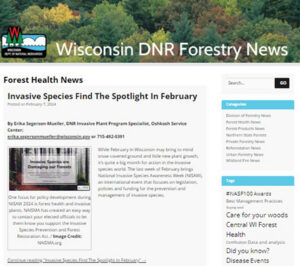By Art Kabelowsky, DNR Forest Health Outreach and Communications, Fitchburg;
Arthur.Kabelowsky@wisconsin.gov or 608-335-0167

A typical main page of the Wisconsin Department of Natural Resources’ monthly Forest Health News publication. / Graphic Credit: Wisconsin DNR
The readers have spoken … well, they’ve filled out their surveys. Now, we’re documenting what we learned.
The Wisconsin Department of Natural Resources (DNR) Forest Health team recently surveyed subscribers to its monthly Forest Health News, an internal and external newsletter sent out during the first week of every month.
Here are some general statistics about the newsletter:
- From March 2023 to March 2024, the subscriber list grew from 5,212 to 6,033 – an increase of 15.7%.
- From November 2023 through March 2024, the newsletter included 41 articles (8.2 per edition), a 14.8% percent increase over the average of 5.6 articles per month from January to October 2023.
- From November 2023 through February 2024, 30 articles drew 3,597 views (an average of 120 per article).
Some key findings from the latest Forest Health News subscriber survey include:
- There were 610 survey responses, representing over 10% of subscribers.
- 58 of the 610 survey respondents were DNR employees.
- 93% of respondents rated the newsletter’s overall content as “good” (60%) or “excellent (33%).
- 88% of respondents said they “always, usually or sometimes” found the newsletter’s content useful to their work.
- The article topic “current pest and disease observations” was seen as most important by 55.9% of respondents.
- Topics found to be “extremely useful” or “mostly useful:” “General information on invasive plants and pests,” 80.6%; “management and regulation of invasive plants,” 78.6%; “current pest and disease observations,” 73.9%; “quarantine and regulation information,” 63.3%.
- Respondents mostly live (91%) and work (70%) in Wisconsin, and 79% own forested land in Wisconsin. Of those landowners, 52% own 11 to 100 acres.
- Respondents are most interested in articles with statewide interest (53%), with 37% most interested in articles about the zone holding their land.
- Geographically, respondents were well distributed across the state, with 27% in the central, 25% in the northeast, 19% in the northwest, 17% in the west central, 13% in the south central and 9% in the southeast zone.
The Forest Health News subscriber survey is held every five years. Members of the Forest Health team will put survey results to use when considering which article topics to focus on each month.
Email Art Kabelowsky, DNR Forest Health Outreach and Communications Specialist, at Arthur.Kabelowsky@wisconsin.gov to provide article suggestions, tips or comments. Please include your contact information.
